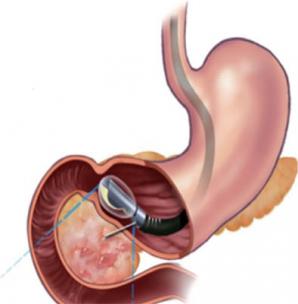Endoscopic Ultrasound
Endoscopic ultrasound, or EUS, is a relatively low-risk procedure that enables your doctor to examine your esophageal and stomach linings and the walls of your upper and lower gastrointestinal tracts as well as nearby organs, including the lungs, liver, gall bladder and pancreas.
 EUS uses a flexible endoscope with a small ultrasound device built into the end. The ultrasound component produces sound waves that create visual images of the digestive tract that extend beyond the inner surface lining. In some cases, depending on the purpose of the test, a thin needle will be threaded through the endoscope to biopsy or collect tissue. EUS can be used to evaluate an abnormality below the surface, such as a growth that was detected during a prior endoscopy or by X-ray. EUS can also be used to diagnose diseases of the pancreas, bile duct and gallbladder when other tests are inconclusive. It can also be used to determine the stage of cancers. If an abnormality is seen during the EUS, tissue samples can be obtained for analysis in real time using a fine needle aspiration technique. Because EUS offers detailed images of your internal organs, it is often used to evaluate and/or diagnose:
EUS uses a flexible endoscope with a small ultrasound device built into the end. The ultrasound component produces sound waves that create visual images of the digestive tract that extend beyond the inner surface lining. In some cases, depending on the purpose of the test, a thin needle will be threaded through the endoscope to biopsy or collect tissue. EUS can be used to evaluate an abnormality below the surface, such as a growth that was detected during a prior endoscopy or by X-ray. EUS can also be used to diagnose diseases of the pancreas, bile duct and gallbladder when other tests are inconclusive. It can also be used to determine the stage of cancers. If an abnormality is seen during the EUS, tissue samples can be obtained for analysis in real time using a fine needle aspiration technique. Because EUS offers detailed images of your internal organs, it is often used to evaluate and/or diagnose:
- conditions causing abdominal pain or abnormal weight loss
- abnormalities, lumps or lesions seen on X-ray or other imaging tests
- diseases of the pancreas, bile duct and gallbladder
- stones or sludge in the biliary ducts
- suspicious masses in the pancreas or liver
- esophageal, gastric, rectal and other gastrointestinal tumors
Preparation/Procedure
Your doctor will provide specific instructions about eating drinking, taking prescription medicines and other preparation for EUS, and it is very important to follow them carefully. Otherwise, the procedure might have to be rescheduled.
Recovery
EUS is a relatively quick and painless outpatient procedure, often conducted under light sedation. If you received sedatives, you will be monitored until most of the medications' effects have worn off. If you had an upper EUS, your throat might be a little sore. You might feel bloated because of the air and water that were introduced during the examination. Unless you’re instructed otherwise, you’ll be able to eat after you leave the recovery area.
Results
Generally, your doctor may inform you of the preliminary results on the day of the procedure, but the results of some tests, including biopsies, may take several days.
Information/Appointment
EUS is performed by fellowship-trained and board-certified gastroenterologists with special training in endoscopic ultrasound. For more information, please call 304.691.8615.
